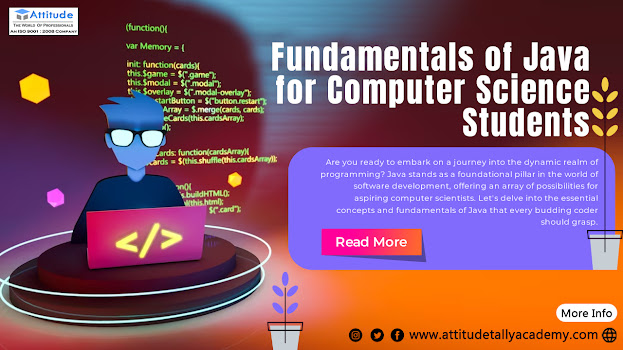Key Concepts and Fundamentals of Java for Computer Science Students
Introduction:
Are you ready to embark on a journey into the dynamic realm
of programming? Java stands as a foundational pillar in the world of software
development, offering an array of possibilities for aspiring computer
scientists. Let's delve into the essential concepts and fundamentals of Java
that every budding coder should grasp.
Object-Oriented Paradigm (OOP): Java's essence lies in its object-oriented programming
language, where
everything revolves around objects. Objects encapsulate both data (attributes)
and behaviour (methods), fostering modular and scalable code structures. This
approach streamlines code management and facilitates easier maintenance—a
cornerstone principle for Java developers.
Core Java Fundamentals: Java Virtual Machine (JVM): Java code is compiled
into bytecode, subsequently executed by the JVM, ensuring platform independence
across diverse environments. Syntax Simplicity: With a syntax akin to
C-based languages like C++ and C#, Java offers a gentle learning curve for
beginners. Data Diversity: Java accommodates a plethora of data types—from
integers to Booleans—empowering versatile data manipulation. Control Flow
Mastery: Mastery over control flow mechanisms such as loops (for, while) and
conditional statements (if-else) is pivotal for steering Java programs' flow.
Functions and Methods: In Java's parlance, functions are referred to as methods,
serving as reusable building blocks to organize and streamline code. The
ability to encapsulate functionality within methods enhances code modularity
and fosters reusability—an indispensable skill for Java developers.
Educational Resources: Embarking on the Java learning journey often begins with
structured courses and training programs. Seek out reputable institutions
offering comprehensive Java courses, spanning from foundational concepts to
advanced topics. A robust training curriculum not only covers syntax nuances
but also emphasizes problem-solving acumen and real-world Java applications.
Practice Makes Perfect: Solidifying Java proficiency entails consistent
practice and project development. Commence your coding odyssey with simple
programs, progressively advancing to intricate projects. Hands-on experience
not only reinforces theoretical knowledge but also cultivates creativity and
problem-solving prowess—an invaluable asset in the programming realm.
Online Learning Communities: Beyond formal education, an
abundance of online resources awaits eager learners in the Java domain.
Participating in Java-focused online communities and forums fosters a
supportive learning environment, offering additional insights and networking
opportunities.
Conclusion: Mastering Java's core concepts and Core Java fundamentals lays a robust foundation for any
aspiring computer scientist. Whether your interests lie in software
development, web engineering, or mobile app creation, Java proficiency unlocks
a myriad of career pathways within the tech industry. So, roll up your sleeves,
immerse yourself in the Java universe, and embark on a thrilling voyage of
coding innovation and exploration!
Suggested Blog:




Comments
Post a Comment